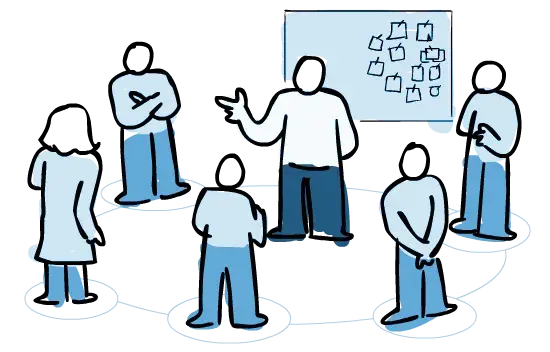EzSupport is CRM Solutions’ web-based portal that is hosted on the cloud to help the firm’s customer support engineers resolve L1 and L2 issues for their flagship healthcare product. A dedicated Scrum team of 9 members (including dev and QA) based in Bangalore is working on this portal. Recently both the Scrum Master and the concerned line manager resigned. The BU head Rita asks the team lead to take over as Scrum Master to run the Scrum ceremonies and report to her on a daily basis since she feels it is a very critical platform supporting a product that earns more than 50% of the company’s revenues. The team runs a 2- week sprint and releases enhancements and bug fixes every two weeks.
During the last three releases, Rita finds that the team has not only delayed releasing critical enhancements and bug fixes but delivered software that had issues in production, once even causing the production server to be brought down for 3 hours. Rita finds herself on the firing line from her management, and decides to take control and starts attending daily stand-ups and planning meetings. The team starts getting defensive in every meeting with pointed questions on the status and over a period of 1 month, the team finds itself losing two critical people who decide to resign due to the pressures from Rita as manager. Rita comes under even more fire since they can’t get replacements quickly enough and over the course of the next 2 months, the project gets into a serious RED status.
You are hired as an Agile coach to help the team get back on track as soon as possible and create user and management confidence in the team to deliver. How would you approach the situation? What would be some of your recommendations?
Suggested Solution:
It is very obvious that a real significant contributor to the problem is Rita and her style which is anything but suited to a typical culture you would expect in an Agile environment. The team lost both their immediate manager and the Scrum Master and it is not clear whether Rita was a contributor to their decision to resign as well – looking at her intrusive and command and control style of working, it would be difficult for anyone reporting to her to feel empowered. With a part-time Scrum Master, and no immediate manager as a cushion for them, the team feels even more under pressure when Rita who is their second line manager starts attending daily stand-ups and asks questions on status. So the real behaviour of the team would switch to acting on specific instructions and trying to protect themselves from fire rather than feel proactive. This has also contributed to less teamwork and ownership on the part of the team.
The biggest issue is to make Rita realize that the major problem lies in her style of functioning. She needs to stay away from day to day ceremonies, provide broad direction to the team and support the team in resolving bottlenecks that the SM cannot help resolve. She needs to start appreciating when the team does something well and show care and concern for the team and the cause they are trying to achieve. She needs to become a coach to the Scrum Master and the team. Your job as an agile coach starts with attending some of the ceremonies, giving inputs to Rita from time to time and having one on one conversation that makes her realize that a different style of functioning (which is more enabling and coaching driven) would work better in bringing out the best in the team. This is a process that could take a few months (at least 3 to 4 sprints at a minimum) to help Rita see the benefits of that style of working. You first need to ensure that Rita’s manager understands the need for this kind of coaching that you as an Agile coach needs to provide to Rita. Once Rita starts listening to you, you can also start directly interacting with the team and coach them to deliver as a team by helping them focus on the right ways of doing things, making the right commitments and ensuring they focus and collaborate well as a team to meet their commitments. Once they start seeing a supportive style from their manager and a coach to help them out directly, most teams will turn around.




